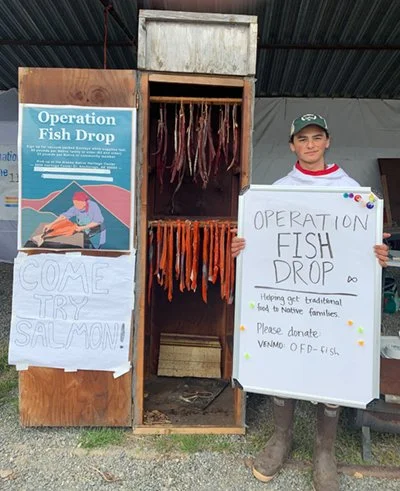Residents of upper Yukon River villages in Alaska who were banned from fishing in the summer of 2021 due to weak runs of keta and Chinook salmon are getting another gift of wild Alaska salmon, thanks to the efforts of a Stanford University senior of Alaska Native heritage
Political science major Sam Schimmel, who is of Kenaitze Indian and St. Lawrence Island Siberian Yupik Eskimo descent, worked with the Alaska Sustainable Fisheries Trust in Sitka, Alaska, to get 2,000 pounds of filleted Bristol Bay sockeyes to the Tanana Chiefs Conference in Fairbanks this past week for distribution to villages in need.
Fishing communities from the mouth of the Yukon to the Canadian border were banned from commercial and subsistence fishing this past summer because of weak salmon runs. Schimmel had helped coordinate efforts earlier in the year, with the Alaska Sustainable Fisheries Trust, to distribute 3,300 pounds of Bristol Bay sockeye fillets to needy families in the Anchorage area.
Schimmel was also a speaker at the start of United Nations Climate Change Conference in Glasgow, Scotland, urging attendees to get more involved in helping others. After his talk, he said he was soon approached by the CEO of the World Wildlife Fund, who asked how he could help.
His own concern, Schimmel said, came as the COVID-19 pandemic spread to Alaska in early 2020, when he realized that core needs of rural residents were not being met, including traditional foods like salmon.
“To address food insecurity, cultural insecurity and to combat poor mental outcome, higher rates of alcoholism and depression, that’s what brought this program together,” he explained.
The Alaska Sustainable Fisheries Trust, an affiliate of the Alaska Longline Fishermen’s Association in Sitka, has a similar concern about providing wild Alaska seafood for those in need.
The trust donates fish in Sitka each week for those in need. “We could see there was a real need, especially with the pandemic. Since their effort began in the summer of 2020, the trust has donated some 630,000 meals, program manager Natalie Sattler said.
More information about Operation Fish Drop is online at https://indigenousstrengths.com/operation-fish-drop and about the Alaska Sustainable Fisheries Trust at https://thealaskatrust.org.

